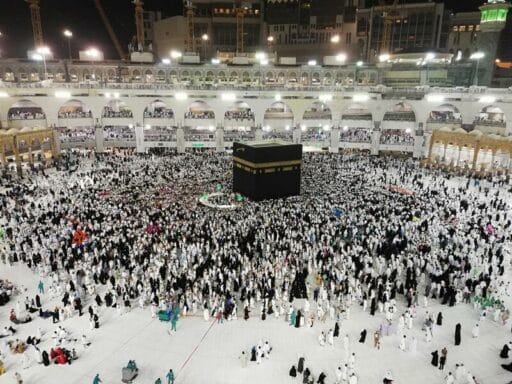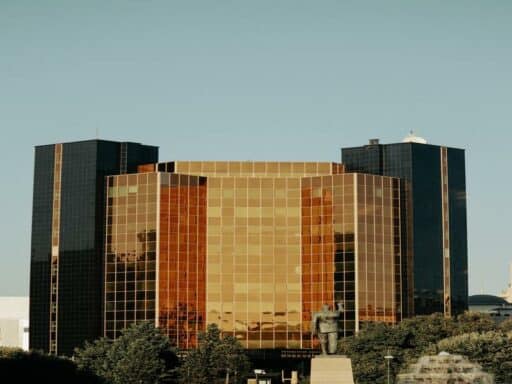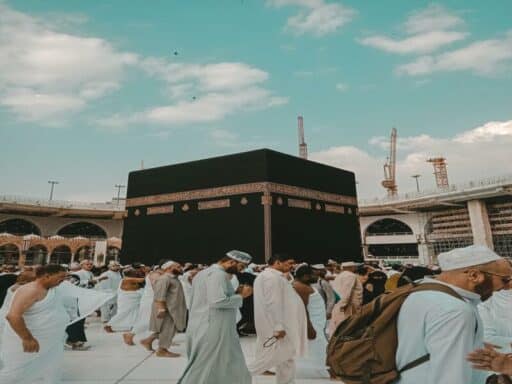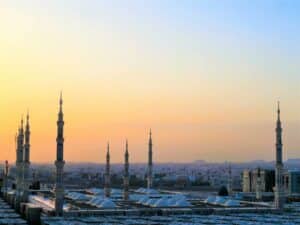Moving to Saudi Arabia from UAE is a decision that many individuals and families contemplate. Being part of the Gulf Cooperation Council (GCC), both countries offer many opportunities. However, transitioning from the UAE to Saudi Arabia requires meticulous planning and understanding of both nations’ cultural, economic, and social nuances.
If you want to invest as an expat or high-net-worth individual, you can email me (advice@adamfayed.com) or use these contact options.
Table of Contents
Why consider moving to Saudi Arabia from UAE?
Saudi Arabia, the largest country in the Middle East, offers many opportunities for professionals, entrepreneurs, and investors. The nation’s rich cultural heritage, strategic location, and robust economy make it an attractive destination for many.
The allure of moving to Saudi Arabia is further magnified by its diverse job market, which spans various sectors from oil and gas to technology and entertainment. Moreover, immersing oneself in a unique cultural experience and lifestyle is a significant draw for many considering the move.
Cultural and economic differences
Saudi Arabia and the UAE, while both members of the GCC, have distinct cultural and economic landscapes.
Economic Differences
The Saudi economy, as highlighted by the World Bank, is on a recovery path, especially after the challenges of 2020. The nation’s economy is primarily driven by its vast oil reserves, making it heavily reliant on oil exports.
However, with global conditions improving and the national vaccination program gaining momentum, the Saudi economy is expected to grow by 2.4% in 2021.
The growth trajectory is further supported by stronger private consumption, the gradual resumption of religious tourism, and increased domestic capital spending.
The UAE’s economy faced challenges due to COVID-19, leading to a contraction in the first half of 2020. However, the nation’s diversified economy, focusing on sectors like tourism, aviation, real estate, and trade, began showing signs of recovery in the third quarter of 2020.
The UAE’s economic prospects are closely tied to the recovery of the global economy, with rising global oil prices expected to boost the hydrocarbon sector.
Additionally, normalizing relations with countries like Israel and Qatar is anticipated to expand economic opportunities.
Cultural Differences
Saudi Arabia is known for its rich cultural heritage and traditions. The nation practices a conservative form of Islam, with customs and traditions deeply rooted in its religious beliefs. This is evident in aspects like the dress code, social norms, and daily routines centered around prayer times.
The UAE, while also an Islamic nation, has a more cosmopolitan culture, especially in cities like Dubai and Abu Dhabi. The country has a significant expatriate population, leading to a blend of cultures and traditions.

While Islamic traditions are revered and practiced, the UAE’s approach to certain aspects, like dress code and social interactions, is more liberal compared to Saudi Arabia.
Understanding the Legalities
Moving to Saudi Arabia demands a thorough understanding of the legalities involved. Every detail matters to ensure a smooth transition, from visa requirements to import regulations.
Visa and residency requirements
Securing the right visa is one of the first steps in moving to Saudi Arabia. Saudi Arabia offers a plethora of visa types, each designed for specific needs. It’s imperative to research diligently and apply for the visa that aligns with your situation.
Types of visas available
Saudi Arabia extends various visa options, including employment visas, family visas, and business visas. Each visa category comes with its set of requirements and durations.
Here are the major types of visas offered by Saudi Arabia:
- Government Visa: Issued to government officials and representatives for official purposes.
- Diplomatic & Official Visas: For diplomats and officials representing foreign governments.
- Diplomatic Missions & Organizations: Issued to members of diplomatic missions or international organizations residing in Saudi Arabia.
- Tourist Visa: For individuals wishing to visit Saudi Arabia for tourism.
- Business Visit Visa: For business representatives and professionals visiting for work-related purposes.
- Employment Visa: Issued to individuals who have secured a job in Saudi Arabia and are moving for employment purposes.
- Residence Visa: For those who intend to reside in Saudi Arabia for extended periods.
- Premium Residency Visa: A special category of visa that offers added benefits and is available under specific conditions.
- Newborn Visa: For newborns in Saudi Arabia to regularize their stay.
- Extension of Exit/Re-Entry Visa: For those who need to extend their exit or re-entry status.
- Family Visit Visa: For individuals who wish to visit family members residing in Saudi Arabia.
- Companion Visa: Issued to the companions of principal visa holders, such as domestic helpers accompanying families.
- Personal Visit Visa: For personal visits that don’t fall under other specific categories.
- Hajj and Umrah Visa: Specifically for Muslims from around the world who are undertaking a religious pilgrimage to Mecca.
- Student Visa: For individuals moving to Saudi Arabia for educational purposes.
Initiate your visa application process well ahead of time. Assemble all the required documents, complete the application form, and forward it to the Saudi embassy or consulate in your country.
It’s crucial to remember that moving to Saudi Arabia with an incorrect visa can result in complications.

Import regulations
An integral aspect of moving to Saudi Arabia is understanding its import regulations. Knowing the rules can save you from potential hassles, whether with personal belongings or vehicles.
Saudi Arabia permits the import of personal items, but it’s essential to be aware of specific restrictions. For example, items that contradict Islamic teachings are prohibited. Ensure you have a clear list of allowed and disallowed items before packing.
If you’re contemplating bringing a vehicle when moving to Saudi Arabia, it’s vital to ensure it adheres to the country’s standards. Different vehicles might have varying regulations based on their make, model, and age.
Additionally, be prepared to pay any import duties that apply. Before shipping your vehicle, verify all requirements to avoid any unexpected challenges upon arrival in Saudi Arabia.
Financial Planning and Banking
Financial planning is paramount when you’re moving to Saudi Arabia. Whether you’re relocating for work, business, or personal reasons, understanding the financial landscape will ensure a smoother transition.
Opening a bank account in Saudi Arabia
After moving to Saudi Arabia, one of the first steps is to establish a financial foothold, which begins with opening a local bank account.
Required documents
You must present several documents to open a bank account in Saudi Arabia. These typically include valid identification (such as a passport), proof of residency (like a rental agreement or utility bill), and employment details (an employment letter or contract). Having these documents on hand is essential to expediting the account opening process.
Choosing the right bank
Saudi Arabia is home to a robust banking sector with several reputable banks. Some top banks include Al Rajhi Bank, National Commercial Bank, and SABB. When selecting a bank, consider factors like online banking facilities, customer service, branch locations, and financial product range. Doing a bit of research can help you find a bank that aligns with your needs after moving to Saudi Arabia.
Currency and remittance
Currency understanding and remittance options are vital for financial planning when moving to Saudi Arabia.
The official currency of Saudi Arabia is the Saudi Riyal (SAR). Before relocating, monitoring the exchange rates between your home currency and the SAR is beneficial. Upon arrival, this will give you a clearer picture of your financial standing and help you make informed decisions regarding currency conversion and transfers.
If you’re from the UAE and plan on sending money back home after moving to Saudi Arabia, you’ll find several reliable remittance services. Companies like Western Union, MoneyGram, and various banks offer competitive rates for money transfers. It’s advisable to compare rates and transfer fees to ensure you’re getting the best deal.
Digital Banking and Fintech in Saudi Arabia
The digital transformation in the banking sector is evident in Saudi Arabia. Many banks now offer comprehensive online banking services, making it easier for expatriates to manage their finances remotely.
Most major banks in Saudi Arabia offer mobile banking apps, allowing users to conduct a range of transactions from their smartphones. This convenience is especially beneficial for those who are always on the move.
Fintech platforms are also gaining traction in Saudi Arabia. These platforms offer innovative financial solutions, from digital wallets to peer-to-peer lending. Embracing these platforms can provide additional financial tools and resources, enhancing your financial experience after moving to Saudi Arabia.

Housing and Accommodation
Securing suitable housing is a top priority when moving to Saudi Arabia. The housing market in Saudi Arabia offers a range of options, from luxurious villas to modest apartments. Whether you’re looking for a temporary or permanent home, understanding the housing landscape is essential.
Renting vs. buying property
When moving to Saudi Arabia, one of the first decisions you’ll face is whether to rent or buy property. Both options come with their own set of advantages and challenges.
Renting
Renting is a popular choice for many expatriates moving to Saudi Arabia, especially those who are still deciding on their long-term plans.
Renting allows you to move easily if your circumstances change. Landlords typically handle maintenance and repairs. Unlike buying, you won’t need a large down payment.
However, renting won’t build equity as you would when buying a property. Rental prices can change, potentially increasing your living costs. Renters often need help making significant changes to the property.
Buying
Buying property in Saudi Arabia can be a worthwhile investment for those considering a long-term stay.
Over time, you’ll build equity in your property. Owning a home provides stability, ensuring you won’t have to move unexpectedly. You have the freedom to modify your property as you see fit.
However, buying requires a substantial down payment. Homeowners are responsible for all maintenance and repairs. Selling and moving can also be more challenging and time-consuming than ending a lease

Popular expatriate neighborhoods
After moving to Saudi Arabia, many expatriates gravitate towards specific neighborhoods known for their expat-friendly amenities and communities. Cities like Riyadh and Jeddah have several popular expatriate areas.
In Riyadh, areas like Al Olaya and Al Sulimaniyah are favorites among the expat community. In Jeddah, Al Hamra and Al Salamah are well-liked. These neighborhoods offer a mix of local culture and familiar comforts, smoothing the transition to Saudi life.
Understanding the rental agreements
Before committing to a rental property in Saudi Arabia, it’s crucial to understand the rental agreement thoroughly. Saudi rental contracts can differ from what you might be used to in the UAE or other countries.
Key Points to Consider:
- Duration: Most rental agreements in Saudi Arabia are for one year, but confirming the lease duration is essential.
- Payment: It’s common in Saudi Arabia for landlords to request rent payments for the entire year upfront. However, some might accept biannual or quarterly payments.
- Maintenance: Ensure the agreement clearly states who is responsible for maintenance and repairs.
- Termination: Understand the terms for ending the lease early and any penalties involved.
By thoroughly researching and understanding your housing options, you’ll ensure a smooth and comfortable transition when moving to Saudi Arabia. Whether you rent or buy, Saudi Arabia offers diverse housing options to fit your needs.
Cultural Adaptation
Adapting to the local culture remains crucial to moving to Saudi Arabia. The nation’s rich cultural tapestry offers a blend of traditions, values, and customs deeply rooted in its history.
Embracing the Saudi culture
Saudi Arabia’s culture is deeply traditional and conservative, with Islam influencing all facets of life. Engaging in local traditions and festivities enriches your experience after moving to Saudi Arabia and fosters understanding and mutual respect.
Dress code and etiquette
Saudi Arabia adheres to a conservative dress code, especially for women. While non-Muslim women are no longer mandated to wear an abaya (a long, flowing robe), they should dress modestly.
Clothing should be loose-fitting and cover the shoulders and knees. Respecting this dress code is essential to blend in and avoid drawing unnecessary attention.
Social norms and behaviors
Building strong relationships with locals after moving to Saudi Arabia requires understanding and respecting social norms.
For instance, making public eye contact between unrelated men and women is discouraged. Additionally, public displays of affection should be avoided, and physical contact with women who aren’t relatives is a no-go.
Religious considerations
Religion is the cornerstone of life in Saudi Arabia, influencing daily routines, laws, and social behaviors.
Daily life in Saudi Arabia revolves around the five daily Islamic prayer times, determined by the sun’s position. During these times, most activities pause, and businesses might close.
To navigate this routine effectively after moving to Saudi Arabia, familiarize yourself with these prayer times. Numerous websites and mobile applications can help you track the exact prayer times.

Respecting the holy month of Ramadan
Ramadan, the holy month of fasting, holds immense significance in Saudi Arabia. During this month, Muslims fast from dawn to sunset, refraining from eating, drinking, and other physical needs.
If you’re in Saudi Arabia during Ramadan, respect these customs. Avoid eating, drinking, or smoking in public during daylight hours.
Role of the Mutaween (religious police)
The Mutaween, or religious police, once held power like the regular police force. While they can no longer detain or question someone suspected of a crime, they continue to act as local authorities.
Respecting their role and adhering to social and religious norms is essential when moving to Saudi Arabia.
Understanding Sharia and its implications
Sharia, the religious law, forms the foundation for judicial law in Saudi Arabia. It extends its influence to politics, economics, family life, and more.
Familiarizing yourself with the tenets of Islam and the implications of Sharia will help you stay on the right side of the law after moving to Saudi Arabia.
Pained by financial indecision? Want to invest with Adam?

Adam is an internationally recognised author on financial matters, with over 760.2 million answer views on Quora.com, a widely sold book on Amazon, and a contributor on Forbes.



